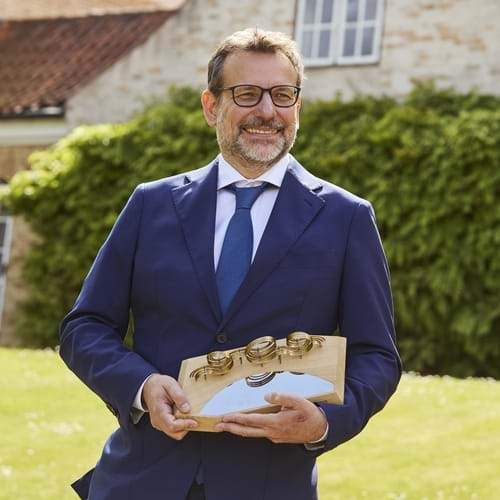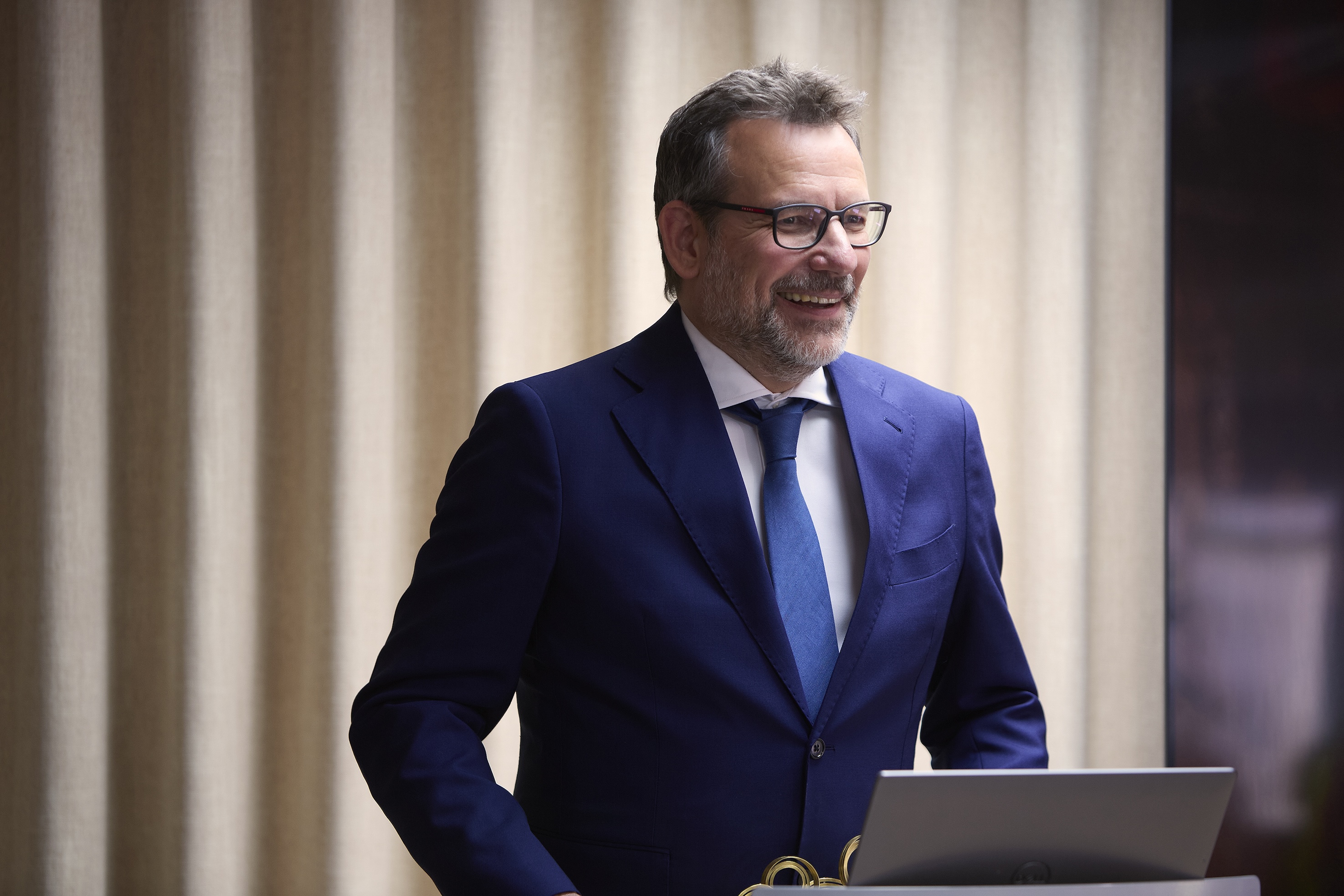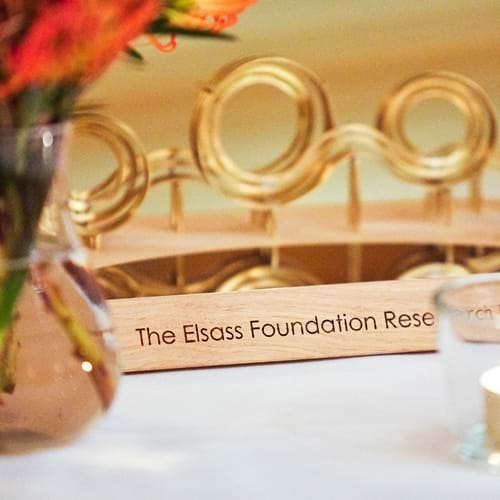Award recipient Andrea Guzzetta: “Every child and every family we help keeps me pushing forward”
Italian CP researcher Andrea Guzzetta is deeply committed to improving the quality of life for children with CP and their families. Learn more about the recipient of the 2025 Elsass Foundation Research Prize and his work on early interventions for infants with CP.
“Every child we help, every family we connect with, and every new discovery keeps me pushing forward.”
These are the words of Andrea Guzzetta, who on May 21st was awarded the 2025 Elsass Foundation Research Prize by Her Royal Highness Princess Benedikte, protector of the Elsass Foundation.
The Italian professor received this prestigious prize for his significant contributions to early detection research in CP. His work includes developing techniques, such as analysing infant movements, to identify early markers of CP, facilitating earlier diagnosis.
An earlier diagnosis allows infants to receive targeted support and therapy while the brain is still adaptable, helping to reduce long-term effects. It is precisely this focus on early intervention for children with CP and their families that, according to the prize committee, has been the cornerstone of Guzzetta’s research career; an effort now recognized with the Elsass Foundation’s international research award of 1 million Danish kroner.
Fascinated by the brain’s adaptability
The 54-year-old Italian researcher is a trained paediatrician specializing in neurology and psychiatry. Through his work in hospitals across England, Germany, and Italy, he has contributed to the field of CP with more than 285 publications in respected journals such as JAMA Pediatrics, Developmental Medicine & Child Neurology, and NeuroImage.
Today, Guzzetta is a professor of paediatric neurology at the University of Pisa, head of the SMILE Lab (Stella Maris Infant Lab for Early Intervention) in Pisa, and internationally recognized for his research in the early detection and treatment of newborns with CP.
Guzzetta describes himself as having a deep passion for understanding how the brain develops and a strong desire to use that knowledge to improve the lives of children and adults with CP.
From early in his career, he was focused on improving early intervention for infants with CP.

The Italian researcher is a trained paediatrician specializing in neurology and psychiatry. FOTO: Elsass Fonden
"It’s incredibly powerful to realize that we, as caregivers, clinicians, and researchers, are part of the infant’s environment and can actively influence neurodevelopment. The idea of being able to support this process is what truly inspired me to dedicate my career to this field."
“I have always been fascinated by the concept of developmental neuroplasticity, the brain’s remarkable ability to reorganize and adapt in response to experiences, particularly in the early stages of life. It’s incredibly powerful to realize that we, as caregivers, clinicians, and researchers, are part of the infant’s environment and can actively influence neurodevelopment. The idea of being able to support this process is what truly inspired me to dedicate my career to this field,” says Guzzetta.
Research that has changed clinical practice
What sets Guzzetta’s research apart is that is has contributed it the earlier initiation of interventions for children being assessed for CP.
Guzzetta has been a key contributor to the “Visual Function Classification System” (VFCS), a framework used in clinical settings to assess how newborns process visual information.
Additionally, Guzzetta has played an important role in the global adoption of the “General Movements Assessment” - a technique that evaluates spontaneous infant movements to identify motor abnormalities. This highly precise technique is regarded as one of the most effective methods for predicting CP.
According to colleagues, Guzzetta’s work has been a gamechanger for clinicians around the world. It enables earlier and more accurate diagnoses in children at risk of CP, allowing timely interventions that can have a significant impact on their development.
The hope of helping children in the long term is the very foundation of Guzzetta’s strong focus on early detection of CP.
“My interest in early detection developed from a deep conviction that earlier identification leads to better outcomes,” explains Guzzetta.
Parents are key players
The list of Guzzetta’s research achievements, initiatives, and projects is extensive.
Among them is the establishment of the SMILE Lab in Pisa, which has been instrumental in advancing research into early brain development and neuroplasticity. The lab has become a global hub for studies focused on motor and visual function in infants with early brain injuries.
He is also one of the driving forces behind Borntogetthere, an EU-funded research and development project that has made major strides in improving early detection and intervention strategies for CP, aiming to reduce functional impairment.

Andrea Guzzetta has established the SMILE Lab in Pisa, which has been instrumental in advancing research into early brain development and neuroplasticity. FOTO: Elsass Fonden.
When asked which of his contributions he is most proud of, Guzzetta points to one area in particular: his research into the role of families in a child’s development.
“Caregiving relationships are not just supportive; they are active contributors to the way the brain develops. Recognizing parents as co-architects of their child’s development has shifted how interventions are designed, delivered, and evaluated,” says Guzzetta.
He emphasizes that the impact of his research ultimately depends on more than just clinical tools.
“It’s crucial that we adopt a family-centred approach and recognize caregivers as key partners in the therapeutic process, ensuring they are equipped, supported, and respected throughout the journey. In parallel, we must also influence community structures and policies that enable inclusion and minimize barriers, whether physical, social, or systemic, for children with CP and their families,” Guzzetta adds.
Science must serve humanity
For Guzzetta, the Elsass Foundation Research Prize opens new possibilities for CP research, particularly in advancing our understanding of neuroplasticity.
If allowed to dream big about the future of CP research, Guzzetta envisions a time when CP can be detected and addressed using advanced neuroimaging (images of the brain) and biomarkers (e.g. blood indicators for disease diagnosis), even before clinical symptoms appear.
“By identifying at-risk infants as early as possible, we also open the door to entirely new lines of research, including pharmacological and stem cell-based treatments. These new approaches have the potential to change the trajectory of neurodevelopment in unprecedented ways. We can begin to explore therapies that don’t just support development but possibly alter the course of the underlying brain injury itself,” says Guzzetta.
No matter how future CP research evolves, Guzzetta is deeply committed to carrying forward the legacy of research with vision and empathy:
“My contribution to CP research lies in continuing to bridge science and clinical practice. At the heart of it all is a belief that science must serve humanity, and that the best science combines evidence with empathy to improve lives. Contributing to this vision and carrying forward the legacy of those who taught and inspired me, is what I value most in my career,” concludes Guzzetta.



